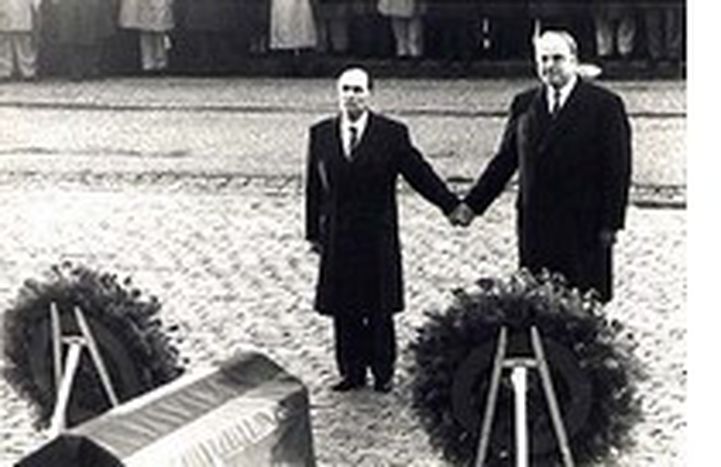
The Franco-German alliance: for better and for worse
Published on
Translation by:
 julie richards
julie richards
The Weimar Triangle summit, taking place on December 5 in Mettlach, Germany, risks spinning the Franco-German axis into the eye of the storm
It was with a gentlemanly kiss on the hand that Jacques Chirac received the new German
chancellor, Angela Merkel, as she made her way to Paris following her election victory last November.
Since this official welcome was played out in front of the world’s media however, relations between Chirac and Merkel have taken a turn for the worse. The European constitution, EU economic policy, the American stance, and not least the integration of the new, smaller member states into Europe have all formed varying matters of contention for the two. The common goal remains the same: maintaining peace at the heart of an ever-expanding Europe. But there are signs that trouble may be brewing.
Relations between Chirac and Merkel are unrecognisable from the close bond that existed between François Mitterrand and Helmut Kohl, or indeed Konrad Adenauer and Charles de Gaulle. From their respective sides of the Rhine, the two current leaders reflect the current climate: there is more questioning, more explaining to do, and a desire to open up to other partners.
Shaky threesome
A partnership cannot survive without a common project and the ability to adapt. Following reunification, Germany found itself directly neighbouring Poland, with whom a rocky history is shared. The Weimar Triangle was born as part of a move to divert attention positively from this tension, in 1991. But the reconciliation of France and Germany with Poland through trilateral cooperation has forced a simultaneous redefinition of Franco-German relations.
From the start, Paris and Berlin have had different visions for the future of the European continent. Kohl was welcoming to the democratic states of the former Communist empire. For example, he was keen to induct the Czech Republic, Hungary and Poland into the then-‘EEC’ as soon as possible. Mitterrand was more of a realist. He favoured a 'confederation of states', foreseeing an enlargement process which would last more than 10 years.
Ten years later, the Franco-German partnership has undergone significant changes, not least with respect to their relations with Warsaw. Poland’s 2004 entry to the EU was not without some trouble. In 2003, a speech by Jacques Chirac against the signatories of the 'letter of 8' aroused considerable unease amongst the Polish public. One thing was clearer than ever; once more, the 'grown-ups' were looking over their shoulders at the 'little ones'.
Following this faux pas, Chirac had to dispel the idea that the Franco-German motor wanted to impose itself in opposition to new member states, especially with the referendum on the European constitution looming. And while the French 'no' vote was a resounding smack in the face, Chirac called upon his two partners from the Weimar Triangle for help when they met at Nancy in May 2005. Schröder, Kwasniewski and Chirac, finally speaking with one voice.
Angie keeps her distance
But Angela Merkel is not Gerhard Schröder. In contrast to the former Chancellor, the German First Lady is more reserved. Relations may still remain cordial, but Angie is happy to show that she does not intend to limit herself to just one privileged relationship. Witness the end of Franco-German exclusivity!
Following defeat at the referendum, French leaders showed their desire to cherry-pick the most important points from the European constitution. But Germany saw abandoning the treaty as out of the question. Nor was there any question of lowering VAT in the catering industry – the Chancellor was even going to raise it in her own country. As for the French Prime Minister, in Merkel's eyes, Dominique de Villepin heralded a Franco-German policy of anti-Americanism that she had never approved of.
Angie prefers, therefore, to keep her distance and increase the number of US-directed initiatives. From his sidelines, Chirac makes eyes at Russia. But they appear firmly closed to vital affairs - Putin and the Chechnya war, or the mysterious assassinations of Russian regime opponents, most famously those of the journalist Anna Politkovskaïa or the ex-spy Alexandee Litvinenko. Could Paris and Berlin perhaps be the best of enemies?
Translated from Couple franco-allemand : pour le meilleur et pour le pire


